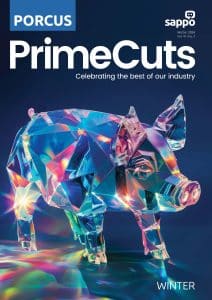I was intrigued with the following article about the 2024 American Association of Swine Veterinarians (AASV) Annual Meeting, entitled, “What Everyone Was Talking About at AASV’s Annual Meeting“, written by Jennifer Shike in Farm Journal’s PORK publication.
Click here to read the full article, but these are some of the quotes worth taking note of:
“What can we do to not become another zombie apocalypse cliché? Know the risk. Know our strengths. Know our weaknesses and have the fortitude to address them. Don’t be complacent. Be prepared. Prevention demands commitment and some investment from all players.”
Luc Dufresne, DVM, Swine Veterinary Partners, in “The Zombie Acpocalypse Approach to Biosecurity, Biocontainment and Disease Control and Elimination”
“We need next-generation traceability. We need to focus on the outcome. We need traceability that is real-time. We need accurate data. It needs to be easy and achievable with existing technology.”
Joel Nerem, DVM, Pipestone, in the Howard Dunne Memorial Lecture, “Swine Veterinarians: Who Are We and Where Are We Going?”
“Did the state of California accomplish its goals with Proposition 12? Did it improve welfare and sustainability? I think there are some real questions about if that occurred. But I think the most important question is, what does the consumer want? At some point we have to give consumers what they want. They said they want Prop 12. If that’s what we’ve been given, we must make our Prop 12 systems work. We have an obligation to the pigs.”
Cara Haden, DVM, director of animal welfare at Pipestone, in “Implications of Prop 12 Compliance”
“Market access is critical. We must continue to prevent foreign animal disease. If we lose our free disease status, it will be an unbelievable game changer. Our industry will survive, but it will never be the same.”
Erin Borror, USMEF vice president of economic analysis, in “Driving Demand Worldwide: What are the economics? What can a veterinarian do?”
“To me sustainability means to leave it a little better than we found it and to stay in business.”
Dan Thomson, DVM, beef industry consultant, in “Staying Alive: Protein Market Sustainability”
“The key to relationships is understanding people. We raise pigs, but we are still in the people business.”
Chris Rademacher, DVM, in the Alex Hogg Memorial Lecture, “Past, Present and Future Challenges for the Swine Industry Profession”
“Successful disease eradication takes consensus, leadership, and knowledge.”
Jeff Zimmerman, DVM, professor at Iowa State University, in “Successful Disease Eradication in the US: What Worked and Why?”
“How can we get good product on the table for the consumer? It’s a job we all need to work on together.”
Grace Houston, DVM, director of veterinary services at Triumph Foods, in “Protecting the Product: A swine vet’s job isn’t done when the pig is loaded on the truck”.
The USA, based on the experience of porcine epidemic diarrhoea virus (PEDV) that wreaked havoc in the USA and Canada when it entered in 2013, are discussing and making plans to prevent other diseases entering, of which African swine fever (ASF) is the most important. PEDV-contaminated feed ingredients have been identified as the most probable route of entry for the 2013 outbreak. The rapid spread of ASF into Asia from 2019 onward is a clear indication of how fast a disease can spread in a naïve herd and the devastation a highly infectious disease that causes high mortalities can cause.
Porcine reproductive and respiratory syndrome (PRRS) is an endemic disease in the USA, reported to cost $150 per sow per annum in losses and control strategies. The eradication of PRRS has been discussed for several years and will require cooperation from all farmers and role players.
South Africa grapples with similar issues, sometimes from a different perspective. ASF has become endemic and so our approach is to reduce internal spread, using compartments and traceability via movement recording to open export opportunities and raise awareness through all the levels of pig farming. Preventing foreign disease introductions is managed via strict protocols on possibly infected pork (PRRS in particular) and rigorous health requirements when importing genetics. Welfare codes are being reviewed.
Sustainability discussions, as in many other countries and back at home in South Africa, are receiving attention. SAPPO’s most recent project has been developing environmental, social, and governance (ESG) standards to address sustainability.
As an industry, we can be assured that in the projects and programmes we are either running and/or initiating, we are on the right track.










